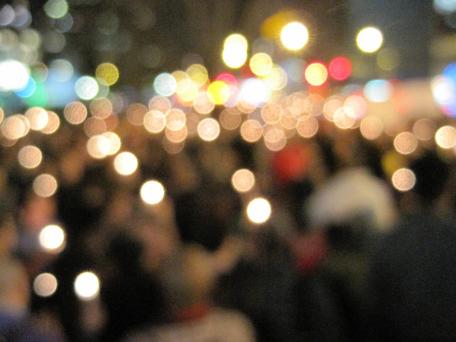My latest column on the Guardian is up: “It’s time for atheists to stop debating God’s existence and decide what to do about it“.
In it, I argue that the atheist movement can’t make critiques of religious belief its whole focus and should be doing more to create justice in this life, which is the only one we’ll ever have. I also argue that the community is already moving in this direction, citing a new mission statement put out by the Secular Student Alliance that makes diversity and social justice explicit goals.
For this column, I spoke with student leaders of atheist student groups around the country, who told me about the intersectional work they’re doing. For reasons of space, the full quotes couldn’t be included in the finished article, so I’m including them here for completeness and by way of thanks to the people who answered my questions and helped me out. Thanks to all of them for their help!
The Secular Student Alliance at the University of Montevallo in Alabama recently organized protests against a county probate judge who defied the federal court ruling on marriage equality. According to the group’s president, Amalia Kortright:
“I view Montevallo as sort of an oasis in the middle of Alabama. Most everyone here is a progressive person, so in a sense I feel like we’re pretty sheltered while we do things on campus. However, we organized a demonstration in response to Shelby County’s refusal to issue same-sex marriage licenses earlier this month, and we received some very negative responses. So when we keep our activity on campus, it’s easier for us to find common ground, but it gets harder when we have more public events and activities… but we’ve also gotten a lot of support and encouragement. The latter means more to us, anyway.”
Amanda Scott, the humanist celebrant and LGBT rights activist in Mobile, explained how her projects are different facets of the same greater mission:
“Intersectionality is important in secular activism because secular people are also women, people of color, LGBT people, and people with disabilities. The secular community should strive to be inclusive of everyone who identifies as secular. Not only that, but secular people understand the struggle for equal rights under the law. Under the common law, we were disqualified from holding public office, held incompetent to testify in court, denied custody of our children, and our wills and testaments rendered void.”
The Sacramento SSA’s advisor, Don Button, spoke about how his group came to broaden its focus beyond “traditional” atheist topics and branch out into sex-positivity, LGBT rights and feminism:
“Initially, I was a bit skeptical because the idea of sex-positivity didn’t seem to fit in our club’s mission. What convinced me was the realization that at that moment in time all but one of the eight active core members of the club were openly LGBT. That’s were the intersectionality of the event (and the club) became a driving focus.”
And the Students for Free-thought at the University of Michigan-Flint have done outstanding work in tackling a whole range of social-justice issues. Here’s their president, Sarah McCarter:
“Last semester we hosted a ‘Die In’ [with the Black Student Union] to protest and raise awareness of police brutality and racial profiling.
For our Climate Change Dialogue we had six members research a specific topic to share and inform peers. Each presentation was fact checked by a fellow student. Topics included fracking, the Keystone Pipeline XL and alternative energy.
Recently we had a round table Death with Dignity discussion. We had a bioethics professor help facilitate and participate in the dialogue.
Currently we are working on hosting a Sexual Assault Speak Out, which will be co-sponsored by our Student Government, Women’s Center and the local YWCA. This event is meant to provide a safe place for survivors of rape, sexual assault, stalking, sexual harassment, and intimate partner violence to share their story. The goal is to make students aware of the impact of sexual assault and make everyone aware of resources on our campus.”
For more on all these student activists and the work they’re doing, continue reading on the Guardian.
